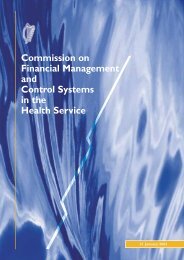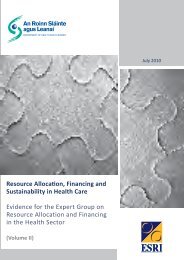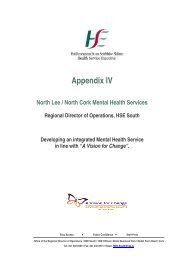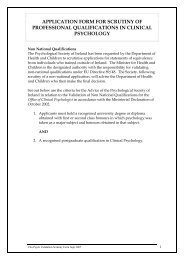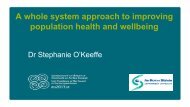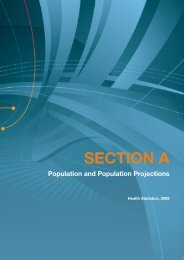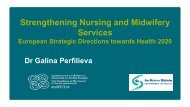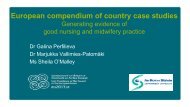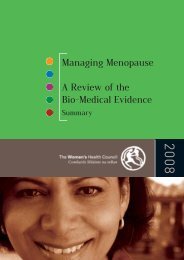All Ireland Traveller Health Study Our Geels - Department of Health ...
All Ireland Traveller Health Study Our Geels - Department of Health ...
All Ireland Traveller Health Study Our Geels - Department of Health ...
You also want an ePaper? Increase the reach of your titles
YUMPU automatically turns print PDFs into web optimized ePapers that Google loves.
<strong>Health</strong> Survey Findings<br />
• cultural factors (breastfeeding rates, early marriages, large family size, concepts <strong>of</strong> health and health<br />
beliefs)<br />
• access to and use <strong>of</strong> health services (including GP consultation rates/hospital attendance rates)<br />
• use <strong>of</strong> prescribed medicines<br />
• use <strong>of</strong> cures<br />
• use <strong>of</strong> dental services/aural services<br />
• use <strong>of</strong> speech therapy services<br />
• use <strong>of</strong> gynaecology/maternity services (including family planning)<br />
• standard/type <strong>of</strong> accommodation and social environment<br />
• community involvement<br />
• sports and leisure activities.<br />
Outline <strong>of</strong> Process Used to Design and Pilot the <strong>Study</strong> Instrument<br />
• <strong>All</strong> potential questionnaire items were extracted from <strong>Traveller</strong> studies and national study<br />
instruments (such as the CSO, the SLAN studies, the Lifeways study, and INSIGHT ’07). Potential items<br />
were collated into a draft questionnaire, which was circulated to the study stakeholders, HSE and<br />
<strong>Traveller</strong>s via the <strong>Traveller</strong> organisations, to assess their suitability for inclusion in the survey<br />
• A copy <strong>of</strong> the draft consultation questionnaire was also posted on the study website to facilitate<br />
wide dissemination<br />
• Feedback was documented on potentially suitable or unsuitable questionnaire items and items<br />
were deleted or new items were added, as appropriate<br />
• Questionnaire wording was changed to more culturally appropriate versions, as required<br />
• By the third round <strong>of</strong> consultation and feedback, the team had a draft paper instrument with a<br />
maximum 45-minute respondent time<br />
• The paper instrument was piloted with <strong>Traveller</strong>s at local level, and changes were incorporated as<br />
required<br />
• Following consultation, the study questions underwent a final adaptation to <strong>Traveller</strong> terminology<br />
and relevant images and pictures were developed and selected by <strong>Traveller</strong>s in regional workshops,<br />
to ensure that the instrument reflected the rich oral-visual culture <strong>of</strong> <strong>Traveller</strong>s<br />
• The questionnaire was then translated into an audiovisual electronic format on laptop computers,<br />
with a <strong>Traveller</strong> voice-over capturing the <strong>Traveller</strong> wording <strong>of</strong> questions<br />
• The computer designed instrument was piloted with <strong>Traveller</strong>s<br />
• The questionnaire was finalised following this consultation process and the audio-visual instrument/<br />
laptop computers was disseminated among study co-ordinators to complete the final training<br />
sessions with their <strong>Traveller</strong> Peer Researcher teams<br />
• Final dress rehearsal successfully completed for quality assurance <strong>of</strong> data collection and data upload<br />
process using modems<br />
53



